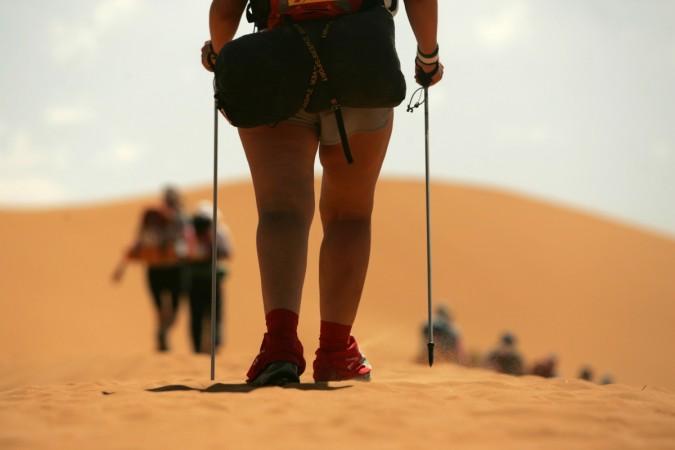
A marathon runner revealed that he had to eat snakes, lizards and drink his own urine and bat blood to survive in the Sahara Desert for ten days after he got lost during the world's toughest foot race, Marathon des Sables.
In 1994, 39-year-old former Olympic pentathlete Mauro Prosperi, took part in the six-day, 155-mile race through the Sahara. The competition is considered to be extremely arduous and dangerous and before embarking on the journey, he was asked to sign a form telling the organizers as to where he wanted to be buried if he died during the race, the Independent reports.
He was one of the 80 participants in the race. Prosperi told BBC that when he first arrived in Morocco, he was "bewitched" by the landscape. By Day Four of the race, he thought he was making good progress until a violent 8-hour sand storm changed everything. "I understood for the first time how powerful a sandstorm could be... The sand whipped my face - it was like a storm of needles. I had to keep moving to keep me from getting buried."
He was "blinded" by the sand the entire time, and when it was over, he was left with just a compass, a sleeping bag, a map and half a bottle of water. All other participants were out of sight.
After the storm ended, he realized that the entire landscape had changed. Even though he had a map and a compass, navigating without points of reference in a desert is very complicated.
"When I realised I was lost, the first thing I did was to urinate in my spare water bottle, because when you're still well-hydrate your urine is the clearest and most drinkable," the runner said, Mirror reports.
Over the next couple of days, he passed a Muslim shrine where Bedouins usually stop when they cross the desert. He took shelter there for a while. He had some rations, which he cooked with fresh urine and he found a "handful o bats" in a tower.
"I cut their heads and mushed up their insides with a knife, then sucked them out. I ate at least 20 of them, raw."
At one point he tried committing suicide as he knew he was headed for a "long, agonising death". He wrote a letter to his wife, Cinzia with the help of charcoal and then cut his wrists.
"I lay down and waited to die but my blood had thickened and wouldn't drain. The following morning I woke up. I hadn't managed to kill myself. Death didn't want me yet."
Eventually, he left the shrine and walked for days, eating reptiles and drinking bat blood.
Meanwhile, the organizers had been looking for him. Prosperi's relatives had come from Italy to join the search operation.
Suddenly, after around nine days a young shepherd girl spotted him near a camp, which was located close to a military base. The women in the camp called for the police who took him to their base blindfolded. "When they found out I was the marathon runner who had got lost in Morocco they took off my blindfold and celebrated."
He was informed that he had crossed the border into Algeria and was 181 miles off course. He was admitted to a hospital in Tindouf, Mauritanian, on the Western Sahara and Moroccan borders. Doctors told him that he had lost 16 kg and he weighed only about 45 kg and also that his liver was completely damaged due to the diet he followed for 10 days.
He lived on a liquid diet for months and took almost two years to recover completely. However, Prosperi was back once again at the Marathon des Sables four years later and has participated in eight marathons since then.
In fact, next year he will be running 4,350 miles coast-to-coast in the Sahara from Agadir, Morocco to Hurghada in Egypt.













